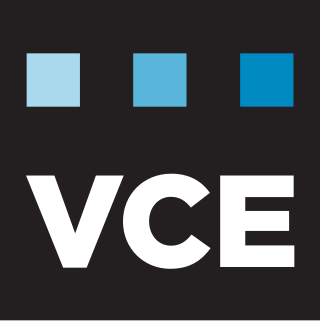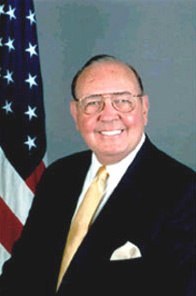
Dell Inc. is an American technology company that develops, sells, repairs, and supports personal computers (PCs), servers, data storage devices, network switches, software, computer peripherals including printers and webcams among other products and services. Dell is based in Round Rock, Texas.

VMware LLC is an American cloud computing and virtualization technology company headquartered in Palo Alto, California. VMware was the first commercially successful company to virtualize the x86 architecture.

Iomega Corporation was a company that produced external, portable, and networked data storage products. Established in the 1980s in Roy, Utah, United States, Iomega sold more than 410 million digital storage drives and disks, including the Zip drive floppy disk system. Formerly a public company, it was acquired by EMC Corporation in 2008, and then by Lenovo, which rebranded the product line as LenovoEMC, until discontinuation in 2018.

OpenText Corporation is a Canadian Information company that develops and sells enterprise information management (EIM) software.

Lenovo Group Limited, trading as Lenovo, is a Chinese multinational technology company specializing in designing, manufacturing, and marketing consumer electronics, personal computers, software, servers, converged and hyperconverged infrastructure solutions, and related services. Its global headquarters are in Beijing, and Morrisville, North Carolina, United States; it has research centers at these locations, elsewhere in China, in Stuttgart, Germany, and in Yamato, Kanagawa, Japan.

Paul Alistair Maritz is a computer scientist and software executive. He held positions at Microsoft and EMC Corporation. In October 2021, Maritz was named as the chairman of the board of directors for Acronis. He also is chairman of Pivotal Software.
World Wide Technology, Inc. (WWT) is a privately-held American technology services company based in St. Louis, Missouri. The company has an annual revenue of $20 billion and employs over 10,000 people. WWT works in the areas of cloud computing, computer security, data centers, data analytics and artificial intelligence, computer networks, application software development, cell phone carrier networking, and consulting services.

Broadcom Inc. is an American multinational designer, developer, manufacturer, and global supplier of a wide range of semiconductor and infrastructure software products. Broadcom's product offerings serve the data center, networking, software, broadband, wireless, storage, and industrial markets. As of 2024, some 58 percent of Broadcom's revenue came from its semiconductor-based products and 42 percent from its infrastructure software products and services.

Silicon Wadi is a region in Israel that serves as one of the global centres for advanced technology. It spans the Israeli coastal plain, and is cited as among the reasons why the country has become known as the world's "start-up nation". The highest concentrations of high-tech industry in the region can be found around Tel Aviv, including small clusters around the cities of Raʽanana, Petah Tikva, Herzliya, Netanya, Rehovot, and Ness Ziona. Additional clusters of high-tech industry can be found in Haifa and Caesarea. More recent high-tech establishments have been raised in cities such as Jerusalem and Beersheba, in towns such as Yokneam Illit, and in Airport City. Israel has the third highest number of startups by region and the highest rate of startups per capita in the world.
Mozy was an online backup service for both Windows and macOS users. Linux's support was made available in Q3, 2014. In 2007 Mozy was acquired by EMC, and in 2013 Mozy was included in the EMC Backup Recovery Systems division's product list. On September 7, 2016, Dell Inc. acquired EMC Corporation to form Dell Technologies, restructuring the original Dell Inc. as a subsidiary of Dell Technologies. On March 19, 2018, Carbonite acquired Mozy from Dell for $148.5 million in cash and in 2019 shut down the service, incorporating Mozy's clients into its own online backup service programs.

3PAR Inc. was a manufacturer of systems and software for data storage and information management headquartered in Fremont, California, USA. 3PAR produced computer data storage products, including hardware disk arrays and storage management software. It became a wholly owned subsidiary of Hewlett-Packard after an acquisition in 2010. In 2015, HP's enterprise assets, including 3PAR, were spun off into Hewlett Packard Enterprise.
Silver Peak Systems, Inc. was a company that developed products for wide area networks (WANs), including WAN optimization and SD-WAN. The company was founded in 2004 by David Hughes. Silver Peak shipped its first product, the NX-series hardware appliance, in September 2005, and their first SD-WAN solution, EdgeConnect, in June 2015.
Pure Storage, Inc. is an American publicly traded technology company headquartered in Santa Clara, California, United States. It develops all-flash data storage hardware and software products. Pure Storage was founded in 2009 and developed its products in stealth mode until 2011. Afterwards, the company grew in revenues by about 50% per quarter and raised more than $470 million in venture capital funding, before going public in 2015. Initially, Pure Storage developed the software for storage controllers and used generic flash storage hardware. Pure Storage finished developing its own proprietary flash storage hardware in 2015.

Virtual Computing Environment Company (VCE) was a division of EMC Corporation that manufactured converged infrastructure appliances for enterprise environments. Founded in 2009 under the name Acadia, it was originally a joint venture between EMC and Cisco Systems, with additional investments by Intel and EMC subsidiary VMware. EMC acquired a 90% controlling stake in VCE from Cisco in October 2014, giving it majority ownership. VCE ended in 2016 after an internal division realignment, followed by the sale of EMC to Dell.
Pivotal Software, Inc. was an American multinational software and services company based in San Francisco that provided cloud platform hosting and consulting services. Since November 2023, Pivotal has been part of Broadcom.

Nexenta by DDN, Inc., is a subsidiary of DataDirect Networks that sells computer data storage and backup software. It is headquartered in San Jose, California. Nexenta developed NexentaStor, NexentaCloud, NexentaFusion, and NexentaEdge. It was founded as Nexenta Systems, Inc., in 2005.

Dell Technologies Inc. is an American multinational technology company headquartered in Round Rock, Texas. It was formed as a result of the September 2016 merger of Dell and EMC Corporation. Dell Technologies ranked 48th on the 2024 Fortune 500 rankings of the largest United States corporations based on its 2023 revenue; its products include personal computers, servers, monitors, computer software, computer security and network security, as well as information security services.
Dell EMC Data Domain was Dell EMC’s data deduplication storage system. Development began with the founding of Data Domain, and continued since that company’s acquisition by EMC Corporation.
Datera was a global enterprise software company headquartered in Santa Clara, California that developed an enterprise software-defined storage platform. Datera was acquired by VMware in April 2021.














